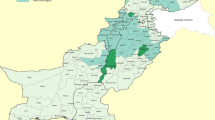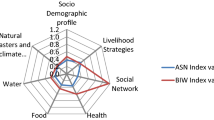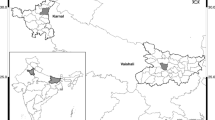Abstract
Climate change can cause negative impacts on agriculture. This paper aims to analyze the changes in the adaptive capacity of livelihood vulnerability to climate change in Ecuador’s Tropical Commodity Crops: Banana and Cocoa. We used the adaptive capacity factor from the livelihood vulnerability index approach, using secondary data from the Survey of Agricultural and Livestock Surface and Production of Ecuador from 2020 to 2022. The results showed that for the banana crops, the livelihood strategy has remained stable, the sociodemographic profile was improving, and the social network got worse in 2021 during the pandemic. Regarding cocoa, the sociodemographic profile has the lowest values of the major components. Lastly, the adaptive capacity was much better in 2022 for both crops, so farmers were becoming more prepared for climate hazards, but they could have better improvement. The policy implications are that agricultural assistance and insurance access should be improved to reduce climate vulnerability.
Access this chapter
Tax calculation will be finalised at checkout
Purchases are for personal use only
Similar content being viewed by others
Notes
- 1.
The Montubios have cultural characteristics and customs typical of the Ecuadorian coastal peasantry. It is a minority group of the Ecuadorian population.
- 2.
The government agricultural kits include subsidized products such as seeds, fertilizers, and agro-inputs.
References
Dell, M., Jones, B.F., Olken, B.A.: What do we learn from the weather? The new climate-economy literature, J. Econ. Lit. 52(3), 740–798 (2014). https://doi.org/10.1257/jel.52.3.740
Allen, M.R., et al.: Framing and context. In: Global Warming of 1.5°C. An IPCC Special Report on the impacts of global warming of 1.5°C above pre-industrial levels and related global greenhouse gas emission pathways, in the context of strengthening the global response to the threat of climate change, sustainable development, and efforts to eradicate poverty [Masson-Delmotte, V., et al. (eds.)]. Cambridge University Press, Cambridge, UK and New York, NY, USA, pp. 49–92 (2018). https://doi.org/10.1017/9781009157940.003
IPCC.: Climate Change 2014: Synthesis Report. Contribution of Working Groups I, II, and III to the Fifth Assessment Report of the Intergovernmental Panel on Climate Change [Core Writing Team, R.K. Pachauri and L.A. Meyer (eds.)]. IPCC, Geneva, Switzerland, p. 151 (2014)
Dell, M., Jones, B., Olken, B.: Temperature shocks and economic growth: evidence from the last half century. Am. Econ. J.: Macroecon. 4(3), 66–95 (2012)
Ministerio del Ambiente, Agua y Transición Ecológica, “Tercera Comunicación Nacional del Ecuador a la Convención Marco de las Naciones Unidas sobre el Cambio Climático” (2017). https://www.ambiente.gob.ec/tercera-comunicacion-nacional-del-ecuador/ (accedido 16 de julio de 2023)
BID, “Vulnerability to Climate Change and Economic Impacts in the Agriculture Sector in Latin America and the Caribbean | Publications” (2020). https://publications.iadb.org/publications/english/viewer/Vulnerability-to-Climate-Change-and-Economic-Impacts-in-the-Agriculture-Sector-in-Latin-America-and-the-Caribbean.pdf (accedido 16 de julio de 2023)
Whitmarsh, L., Capstick, S.: Perceptions of climate change, in Psychology and climate change: human perceptions, impacts, and responses, San Diego, CA, US: Elsevier Academic Press, pp. 13–33 (2018)
Mango, N., et al.: Awareness and adoption of land, soil and water conservation practices in the Chinyanja Triangle. South. Afr. Int. Soil Water Conserv. Res. 5(2), 122–129 (2017)
Mairura, F., et al.: Determinants of farmers’ perceptions of climate variability, mitigation, and adaptation strategies in the central highlands of Kenya. Weather, Clim. Extremes 34, 100374 (2021)
Lamichhane, P., et al.: What motivates smallholder farmers to adapt to climate change? Insights from smallholder cropping in far-western Nepal. Anthropocene 40, 100355 (2022)
Gao, J., et al.: Climate change resilience and sustainable tropical agriculture: farmers perceptions, reactive adaptations and determinants of reactive adaptations in Hainan. Atmosphere 13(6), Art. no 6, China (2022). https://doi.org/10.3390/atmos13060955
Piedra-Bonilla, E., Cunha, D., Braga, M.: Diversificação agrícola na bacia hidrográfica do Rio das Contas. Bahia Geosul 34, 280–306 (2019)
Hahn, M., Riederer, A., Foster, S.: The Livelihood Vulnerability Index: a pragmatic approach to assessing risks from climate variability and change—A case study in Mozambique. Glob. Environ. Change 19(1), 74–88 (2009)
Piedra-Bonilla, E.B., da Cunha, D.A., Braga, M.J.: Climate variability and crop diversification in Brazil: An ordered probit analysis. J. Cleaner Prod. 256, 120252 (2020)
Mills-Novoa, M., et al.: Governmentalities, hydrosocial territories & recognition politics: the making of objects and subjects for climate change adaptation in Ecuador. Geoforum 115, 90–101 (2020)
Asociación de Exportadores de Banano del Ecuador: Informe I Trimestre 2020, AEBE, vol. 141 (2020)
Instituto de Promoción de Exportaciones e Inversiones, Dirección de Inteligencia Comercial e Inversiones – PRO ECUADOR. https://www.proecuador.gob.ec/estudios-de-inteligencia-comercial/. Accessed 03 Sep 2023
Ministerio de Agricultura y Ganadería. MAGAP impulsa proyecto de reactivación del Cacao Fino y de Aroma (2017). https://www.agricultura.gob.ec/magap-impulsa-proyecto-de-reactivacion-del-cacao-fino-y-de-aroma/. Accessed 03 Sep 2023
Central Bank of Ecuador, Evolution of the Trade Balance by Products January -June 2022
INEC: Encuesta de Superficie y Producción Agropecuaria Continua (ESPAC): Metodología (2022)
Arifah, D., Salman, Yassi, A., Demmallino. E.: Livelihood vulnerability of smallholder farmers to climate change: a comparative analysis based on irrigation access in South Sulawesi, Indonesia. Reg. Sustain. 3(3), 244–253 (2022)
FAO FAOSTAT Online Database. http://faostat.fao.org/. Accessed 06 June 2020
Ministerio de Agricultura y Ganadería. Presentación Gran Minga Nacional Agropecuaria. https://www.agricultura.gob.ec/gran-minga-agropecuaria-2/. Accessed 20 Aug 2023
Acknowledgments
The authors gratefully acknowledge comments and suggestions by the anonymous reviewers. The authors thank Nancy Johnson for the thoughtful suggestions on the manuscript versions. Author EPB gratefully acknowledges the Mentoring Program for Women Agricultural Economists in the Global South, which is a collaboration of African Women in Agricultural Research and Development (AWARD) and the International Association of Agricultural Economics (IAAE) through its International Committee of Women in Agricultural Economics (ICWAE).
This study was part of the research project “Estimation of the impact of extreme weather on the performance of Ecuador’s agro-export sector,” funded by Ecotec University.
Author information
Authors and Affiliations
Corresponding author
Editor information
Editors and Affiliations
Rights and permissions
Copyright information
© 2024 The Author(s), under exclusive license to Springer Nature Switzerland AG
About this paper
Cite this paper
Piedra-Bonilla, E., Echeverría, Y. (2024). Changes in the Adaptive Capacity of Livelihood Vulnerability to Climate Change in Ecuador’s Tropical Commodity Crops: Banana and Cocoa. In: Florez, H., Leon, M. (eds) Applied Informatics. ICAI 2023. Communications in Computer and Information Science, vol 1874. Springer, Cham. https://doi.org/10.1007/978-3-031-46813-1_24
Download citation
DOI: https://doi.org/10.1007/978-3-031-46813-1_24
Published:
Publisher Name: Springer, Cham
Print ISBN: 978-3-031-46812-4
Online ISBN: 978-3-031-46813-1
eBook Packages: Computer ScienceComputer Science (R0)




